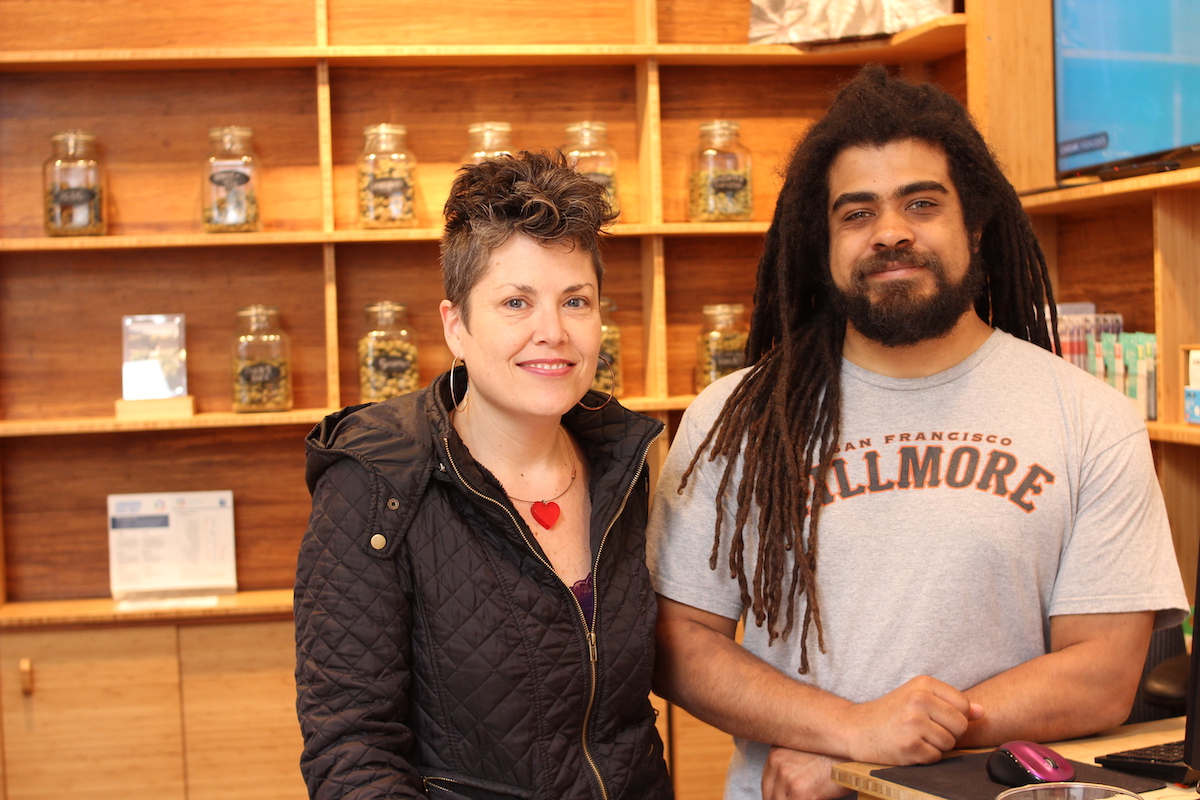
One Woman’s Goal to Give Back to the Aging and LGBTQ Communities
Written by Art Cosgrove
Panacea is an elegant and cozy dispensary which sits on a busy stretch of Sandy Street in Northeast Portland. Owned and managed by Melissa Egan, Panacea has been in operation since the start of Oregon’s legal cannabis boom two years ago. As a former industry outsider, Egan said her aim is to turn the dispensary into a new model for social justice.
“My first career was in criminal justice. So the Drug War, the impacts of that, that was very important to me,” says Egan over coffee at a bakery a few blocks away from the dispensary. Though she remains reserved, she’s also excited to talk about her backstory and the roots of the dispensary.
Egan worked in the field of mediation and conflict resolution, attempting to bring victims and offenders together to put conflicts to rest. After that, she was hired by the Department of Corrections as a sentence analyst, all the while cultivating an interest in the business of cannabis on the side. She then saw a way to combine her interests after taking a position working for Portland lawyer, Sam Imperati, at the Institute for Conflict Management (ICM). They worked on long-term consultations, such as the Portland Airport Futures project, and others throughout the state.
“That’s how I got this great experience, sitting at all these policy tables and [with] task forces around the state,” says Egan of her time working for Imperati.
By 2011, Egan was looking for new opportunities while also serving as the co-chair for the Homeless Youth Oversight Committee for Multnomah County. The committee included various interests and stakeholders in the housing field.
“I want to develop affordable housing for LGBT seniors. It’s a totally unmet need. It’s a part of the culture we’re not talking about,” Egan says she told Imperati. He agreed, and the seed of the idea was born. However, their plans were impeded by the death of Egan’s father.
“Helping people die is very hard,” she says, as she spoke of her father’s passing. She helped care for him, and came face-to-face with the stark reality of the effects of getting older and passing. She then thought of how she would face the inevitable final phase of life, and thought of others in the LGBTQ community, knowing they would be the most vulnerable.
“When you look at the data, you can slice and dice any racial category, and the LGBTQs of the category will have higher rates of substance abuse, poverty, suicide, homelessness… still to this day, 40 percent of youth on the street are LGBTQ,” says Egan, calling upon her expertise from all fields. But her experience sitting on committees also told her it wouldn’t be easy.
“I think my work helped me understand just how big these projects really have to be to get anything done,” Egan adds, “but I know weed makes money. I just saw it as a source of generating funds that was probably pretty solid. And if I did it right, it could be a no-brainer.“
 Egan’s start in the industry was boosted when she met Jesce Horton, leader of the Portland area Minority Cannabis Business Association.
Egan’s start in the industry was boosted when she met Jesce Horton, leader of the Portland area Minority Cannabis Business Association.
Egan credits Horton with co-founding Panacea. She also credits him with helping to guide her as she opened the dispensary. Horton sits on several important boards that are at the crossroads of cannabis policy making, including the Portland Marijuana Policy Oversight Team and the Oregon state Cannabis Task Force.
Egan is shaping her business around the concepts of Nobel Prize winning economist and pioneer of microfinance, Muhammad Yunus. Since the start two years ago, Panacea has performed steadily, though not to the point where they are donating the profits they hope to be in the future. Egan says last year they donated 1 percent of pre-tax sales to nonprofits and other social justice causes, and hopes that will only continue to grow.
Attributing many of the issues she has to deal with to the bureaucracy and pitfalls of the still-fledgling state-level legalization initiative, Egan sees brighter days on the horizon.
 “In the future the industry will equalize, we’ll be treated like a regular small business… once things become normal, I think we’re going to do okay.” says Egan.
“In the future the industry will equalize, we’ll be treated like a regular small business… once things become normal, I think we’re going to do okay.” says Egan.
Right now things are hectic in the Portland retail cannabis scene. Dispensaries are still popping up seemingly everyday; Egan notes that two have opened up within just a few blocks of her store on either side. To help set it apart from the competition, Panacea offers more than just the regular slate of products, like flower, concentrates or edibles, but also free consultations with an on-site nurse. Soon, they will launch a pro-class for people who want to learn to be bartenders. She is confident that Panacea will outlast the new crop of dispensaries and live to fulfill its social mission.
“It’s more of an aspirational future-thinking business model. We live in an era where cannabis money is poison, so I can’t put it in a bank,” says Egan, “all I’m doing is germinating an idea.”



Leave a Reply